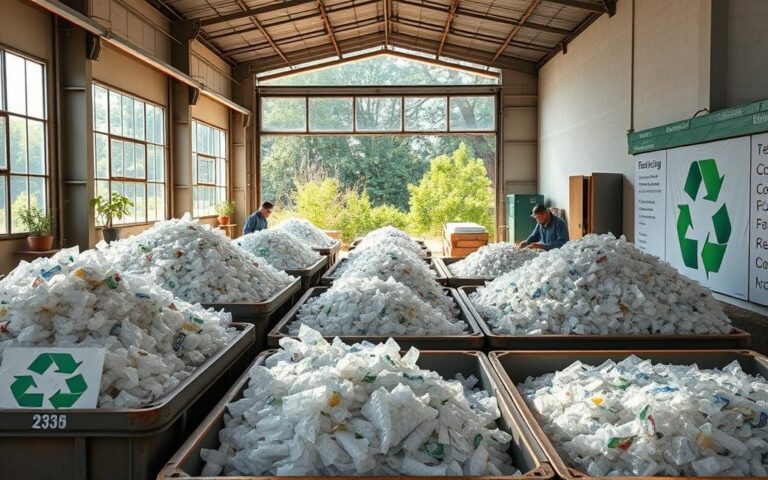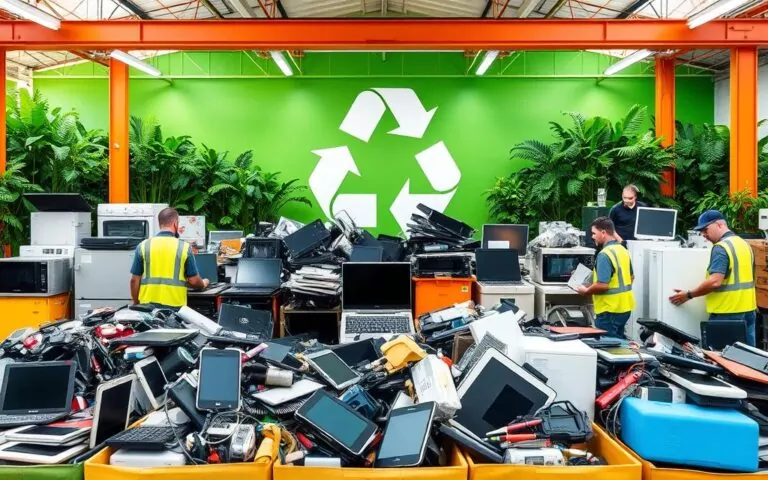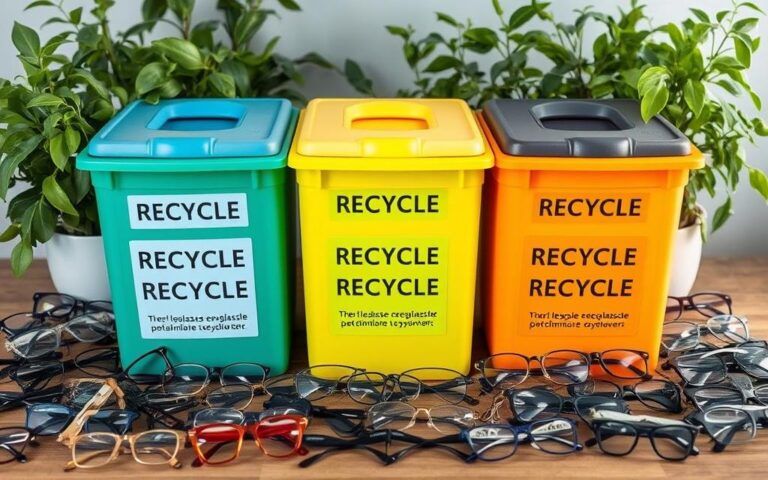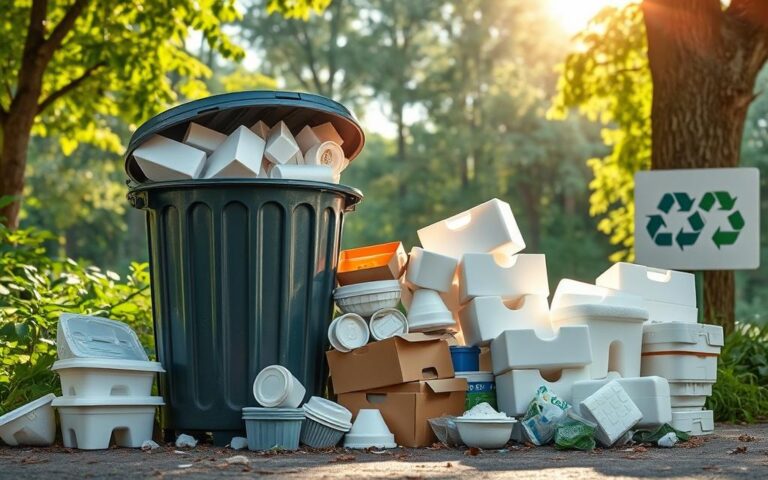How to Recycle Books: Eco-Friendly Options for Disposal
Understanding how to recycle books is vital for a greener future. Every year, about 320 million books are thrown away. We can prevent these valuable resources from becoming waste by recycling. This safeguards our forests and cuts the need for making new paper. Right now, only 33% of paper pulp comes from recycled stuff. Recycling paper saves 17 trees and 4,100 kilowatt-hours of electricity for every ton.
This article will guide you on how to handle your old books in eco-friendly ways. You’ll learn about recycling, repurposing, donating, or selling them. By choosing these green practices, you help the Earth. Plus, you support a culture of reading that’s good for people and the planet.
Why is Recycling Books Important?
Recycling books is vital for both the environment and the economy. When we recycle, we not only help the planet but also see economic benefits. This decision promotes ecological well-being and recognizes recycling’s economic gain.
The Environmental Benefits of Recycling
Recycling books lowers waste, saves resources, and cuts down on harmful gases. Using recycled paper needs much less energy than making new paper. This reduces air pollution and uses fewer resources.
It also makes less greenhouse gas and needs less water, which is good for the earth. For every ton of paper recycled, 17 trees are saved. This helps forests and lets trees keep removing carbon from the air.
The Economic Advantages
The economic benefits of recycling books are clear. Selling used books brings in money and finds them new readers. Donating books helps charities, schools, hospitals, and libraries, supporting our communities.
It also gets books to those in need, improving literacy. Renting books is becoming popular, spreading knowledge without waste. By understanding recycling benefits, we support a world that values reused resources.
| Impact Type | Recycling Action | Key Outcomes |
|---|---|---|
| Environmental | Recycling Paper | Conserves energy, reduces air pollution, and preserves trees |
| Social | Donating Books | Supports literacy and access to reading in communities |
| Economic | Reselling Books | Generates income and promotes sustainable consumption |
In summary, recycling books is key across environmental, social, and economic areas. It is a core part of living responsibly.
How to Recycle Books in 2024
To recycle books effectively in 2024, you need to know the current recycling guidelines. These can vary by location and book condition. It’s important to keep up with the book recycling rules to make sure your efforts help the planet.
Staying Updated with Recycling Rules
Earth 911 helps you find the latest book recycling practices nearby. Local recycling centers might have different rules for accepting books. For instance, some accept only paperbacks while others take both hardcovers and paperbacks.
Before recycling your books, consider these steps:
- Look up the current recycling guidelines at your local center.
- If needed, remove hardcovers as they can be tricky to recycle.
- Check if your books are too damaged to recycle.
To understand which books you can recycle, see this table:
| Type of Book | Recyclable? | Notes |
|---|---|---|
| Paperback | Yes | Widely accepted, including by curbside recycling in cities like Pittsburgh and Kansas City. |
| Hardcover | Varies | Accepted by some centers; others require cover removal. |
| Severely Water-Damaged Books | No | Can’t be recycled; see local guidelines for disposal. |
By staying informed and adhering to the book recycling rules, you’ll improve your recycling habits and help the environment.
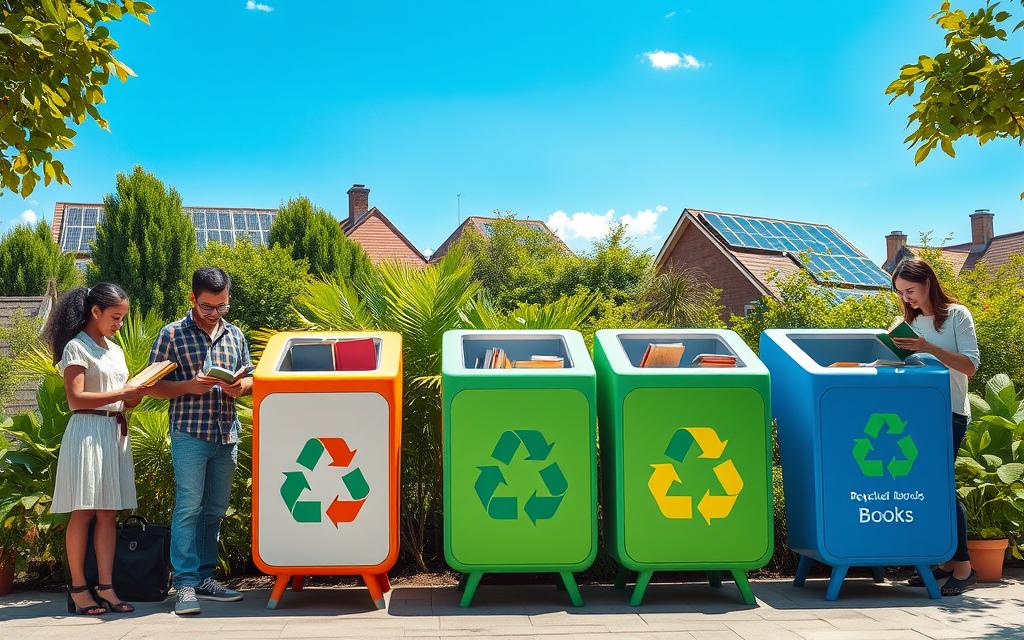
Sell Your Books for Cash
Selling your unwanted books is smart for both your wallet and the planet. Today, many online platforms make it simple to enter the used book market. They offer smart ways to figure out what your books are worth. Meanwhile, local bookshops give a community feel to selling your reads.
Online Platforms for Selling Books
Lots of websites help you sell used books. BookScouter is great because it checks prices from over 30 shops to get you the best deal. It’s a good first step for sellers. Amazon lets you pick how to send your books based on your payment method. eBay is good for rare finds, but common books may not sell for much. Etsy is another choice, but remember, there are extra fees like listing and selling charges.
Local Bookstores and Campus Bookstores
Selling to local bookstores really makes the process better. Powell’s Books and Half Price Books are popular for in-person sales. Powell’s only takes books in great shape. Campus bookstores are good for students to sell back textbooks. Places like community markets or thrift shops are also good for local sales.
Using local bookstores for selling means quick cash and building connections with shop owners. This can lead to more opportunities in the future.
| Platform | Type | Key Features |
|---|---|---|
| BookScouter | Online | Price comparisons from over 30 vendors |
| Amazon | Online | Two fulfilment methods, variety of selling plans |
| eBay | Online | Auction system, ideal for rare books |
| Half Price Books | Local | Buys recent publications and popular titles |
| Powell’s Books | Local | Books must be in excellent condition |
Donate Your Old Books
Donating books is a great way to help communities. It gives your old books a new home. Many places accept book donations, like book charities, thrift stores, and schools. These donations support learning and literacy.
Charities and Thrift Stores
Several organisations hope to get educational book donations. Some include:
- The Salvation Army: It’s a big provider of social help worldwide. They accept book donations for community projects.
- Goodwill: This non-profit helps with job training and finding jobs. They sell donated books to fund their programs.
- Better World Books: An online shop that raises money for literacy across the globe by selling used books.
Local thrift shops also love to get book donations. Your books help them carry on their charity work and reach out to the community.
Educational Institutions and Libraries
Books given to schools, libraries, or educational bodies can boost literacy. These places welcome good quality used books to grow their collections. Groups like Books for Africa and Operation Paperback Books for Soldiers send books to those who really need them, like students and US troops.
Before you donate books, talk to the organisations. Find out what they need most. A simple call can check if your books match their literacy goals.
| Charity Organisation | Focus Area | Donation Impact |
|---|---|---|
| The Salvation Army | Social Aid | Supports community services |
| Goodwill | Employment Services | Job training and placement |
| Books for Africa | International Education | Diverse students benefit from books |
| Operation Paperback | Military Support | Books sent to troops and families |
| Better World Books | Global Literacy | Supports worldwide literacy initiatives |
Donating books can have a big effect on people and places. It promotes reading and helps various charities in their work.
Give Them Away or Trade Books
Sharing books builds community and boosts literacy. Want to inspire or declutter? There are plenty of ways to share your books. Give them away or trade them to refresh your local literary scene.
Online and Community Platforms
Online platforms are a great way to give away or trade books. Sites like Craigslist and Freecycle connect people for book swaps. Local Facebook groups also facilitate these exchanges, making it easy to find eager readers.
- Organise a local book exchange in your area.
- Advertise on community forums to reach readers.
- Leave books in public spots with a “Free” sign for random swaps.
These activities create a community of book lovers. They strengthen neighbourhood ties. By hosting events, you keep books alive and shared.
Better World Books and local libraries often support book donations and swaps. Participating in these lets you discover new books while being eco-friendly. This keeps the book-sharing culture vibrant in your community, ensuring your books enjoy a long life.
| Platform | Type | Benefits |
|---|---|---|
| Craigslist | Online Free Listings | Reach a wide audience locally |
| Freecycle | Online Community | Emphasises recycling and giving |
| Local Facebook Groups | Social Media Exchange | Easy connection with nearby readers |
| Library Events | Community Exchanges | Boosts local engagement and reading |
How to Recycle Books
To recycle books well, follow several steps for proper and responsible handling. Start by preparing for book recycling. Preparing your books properly boosts their recycling success. This helps our environment greatly.
Preparing Your Books for Recycling
Before recycling, take important steps. First, remove any personal details to keep your privacy. Then, take out any bookmarks or notes. This makes sure the books are good for selling or recycling. Most recycling centres take paperbacks directly. But, hardbacks need more work; their tough covers and the glue on the spine must be taken off, say librarians.
- Remove personal information
- Take out foreign objects
- Ensure books are in recyclable condition
- For hardbacks, detach covers and glue
Choosing the Right Recycling Method
Once your books are ready, pick the best recycling method. The method depends on local rules and your book’s condition. Paperbacks often go in curbside bins. But, send damaged books to places like Terracycle for special recycling. You can also use drop-off centres that focus on books.
Local charities and groups like Friends of the Library sometimes take recycled books. They turn them into pulp for money. Online, groups like Buy Nothing on Facebook are good for giving books away. These efforts help stop 640,000 tons of books from filling landfills every year, research shows.
In conclusion, choosing a good recycling method helps properly dispose of books. It helps our environment too. By knowing and acting, we can make book recycling easy and valuable for all.
Conclusion
We can’t stress enough how vital it is to recycle books. Every year, over 320 million books are thrown away, adding up to 85 tons of paper waste. To fight this, we can choose to donate, sell, or trade our books. These simple steps can have a big impact on the environment and help more people read.
Remember, recycling should be our last option. It’s better to reuse or repurpose books first. Turning old books into art projects or swapping them are great ways to give them a new life. But if you must recycle, make sure to do it right by following your local rules.
When we recycle books the right way, we save resources and support learning. Every effort to dispose of books responsibly leads us closer to a sustainable world. By getting involved in book recycling, we inspire change for the betterment of our communities and the Earth.
FAQ
Why should I recycle my old books?
Recycling your old books is key to reducing waste and saving trees. It cuts down on greenhouse gases and uses less energy than making new paper. By recycling, you help protect our planet.
What are the best ways to dispose of unwanted books?
You can recycle, donate, sell, or share your unwanted books in many ways. Giving them to charities, selling on the internet, or joining a book swap are good ideas. These actions help the environment and the community.
Are all types of books recyclable?
Some books, like hardbacks, are tricky to recycle due to glue. Always check your local recycling rules to know what’s accepted.
How can I check which recycling options are available near me?
Use sites like Earth 911 to find nearby recycling spots. It’s also smart to talk to your local recycling centre for the latest info.
Can I sell my used books online?
Absolutely! Websites like BookScouter, eBay, and AbeBooks let you sell your books. They help you find the best deals from various buyers.
What charitable organisations accept book donations?
Groups like Goodwill and the Salvation Army welcome book donations. Local shops and schools also enjoy receiving books. This supports literacy in your area.
How do I properly prepare my books for recycling?
Before recycling, take out any personal info and make sure the books are clean. Remove bookmarks and notes too, following your area’s recycling rules.
What are some community platforms for trading books?
Sites such as Craigslist and Facebook groups are perfect for sharing books. Setting up a community book swap is another great way to share and recycle books.










